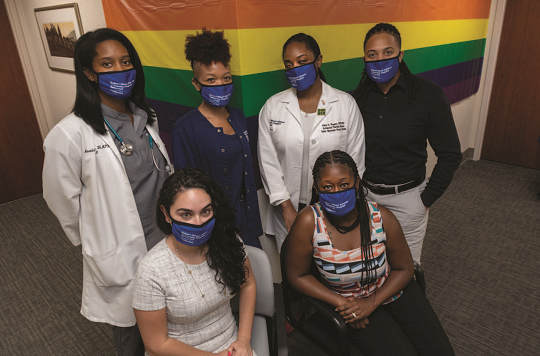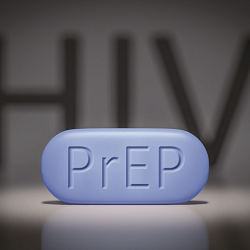"At PROUD, the staff members look at you as a person. I recommend it to everyone I know."

The Babs Siperstein PROUD Center offers medication to reduce the risk of HIV infection.
Abraham Linares, 26, a bilingual sexual health counselor at the Hyacinth Foundation in Plainfield, was searching for a primary care doctor who would take a more holistic approach to his health. As a cisgender gay man, he was also hoping to find a clinic that would be sensitive to his needs. In addition, he was interested in taking PrEP, a medication that reduces a person’s risk of contracting HIV.
As a sexual health counselor, Abraham had heard of the Babs Siperstein PROUD Center at Robert Wood Johnson University Hospital (RWJUH) Somerset and decided to make an appointment.
The PROUD Center provides health services to the lesbian, gay, bisexual, questioning, intersex and asexual (LGBTQIA) community, including primary care, immunization, HIV prevention, hormone therapy, sick visits, chronic illness management, health education and counseling, and support groups. It also offers telehealth visits.
“The environment was very welcoming,” says Abraham, whose first appointment was in March 2019. “Also, I saw myself represented at PROUD. There are people from all ethnicities and racial groups.”
He saw his new physician, Amanda Francis, DO, and had a physical exam.
“The doctors at PROUD explain how they do things and why they do them,” he says. “They look at you as a whole person. They also have an accepting and nonjudgmental approach to sexual health.”
Preventing HIV
PROUD has offered PrEP, which stands for “pre-exposure prophylaxis,” for three years.
About 10 percent of patients are taking it, says Alicia K. Rogers, MSN, APN-BC, a nurse at PROUD.
“It’s lifesaving,” she says. “Also, it allows people to take their sexual health into their own hands.”
There are two types of PrEP. The newer medication has fewer side effects, but it hasn’t been tested on people who were born female, says Rogers. Side effects include nausea, diarrhea, headache, fatigue, and abdominal pain. They’re usually mild and short-lived.

In order to get a prescription, a patient needs a physical exam first. At the end of the visit, a nurse tests the patient for sexually transmitted diseases (STDs) like hepatitis, gonorrhea, and herpes.
“We want to make sure the patient doesn’t have any STDs,” says Rogers.
The drug doesn’t protect against other STDs, although it can be used as a treatment for hepatitis B. Every three months, the patient is retested for all STDs.
Financial Assistance
PrEP is costly; a 30-day supply runs about $2,000 without insurance or financial assistance, says Rogers. PROUD works with PrEP’s manufacturer, Gilead, to ensure the drug is available to patients.
“Gilead gives us discount cards for the underinsured population,” says Rogers. “Some insurance companies cover it, and some don’t. The newest type of PrEP is less likely to be covered.”
Abraham was concerned about the cost.
“I was afraid I’d need to pay for it myself,” he says. Fortunately, the PROUD staff helped Abraham sign up for a program through Gilead. He received the drug for free initially, then his insurance covered it. “It was a smooth process,” he says.
Abraham returns to PROUD for the PrEP-related blood work every three months. He’s grateful for the care he receives.
“When I went to my previous health care providers, I felt like I was just another patient,” he says. “At PROUD, the staff members look at you as a person. I recommend it to everyone I know. My friends think it’s amazing, too.”

Best Candidates
The drug is designed for people who are HIV-negative and are at risk of contracting the virus. You may be able to take the medication if you meet the following criteria, according to the Centers for Disease Control and Prevention:
- You’ve had sex in the past six months and you have a sexual partner with HIV, haven’t consistently used a condom, or have been diagnosed with a sexually transmitted disease recently.
- You inject drugs and have an injection partner with HIV or you share needles, syringes, or other equipment to inject drugs.
How Effective Is PrEP?
Studies show that pre-exposure prophylaxis, or PrEP, reduces the risk of contracting HIV through sex by about 99 percent when taken daily, according to the Centers for Disease Control and Prevention. It also reduces the risk of developing the infection by 74 percent among people who inject drugs. The medication, which must be taken daily, works by stopping HIV from spreading.
For more information, visit the Babs Siperstein PROUD Center or call (855) 776-8334 to schedule an appointment.